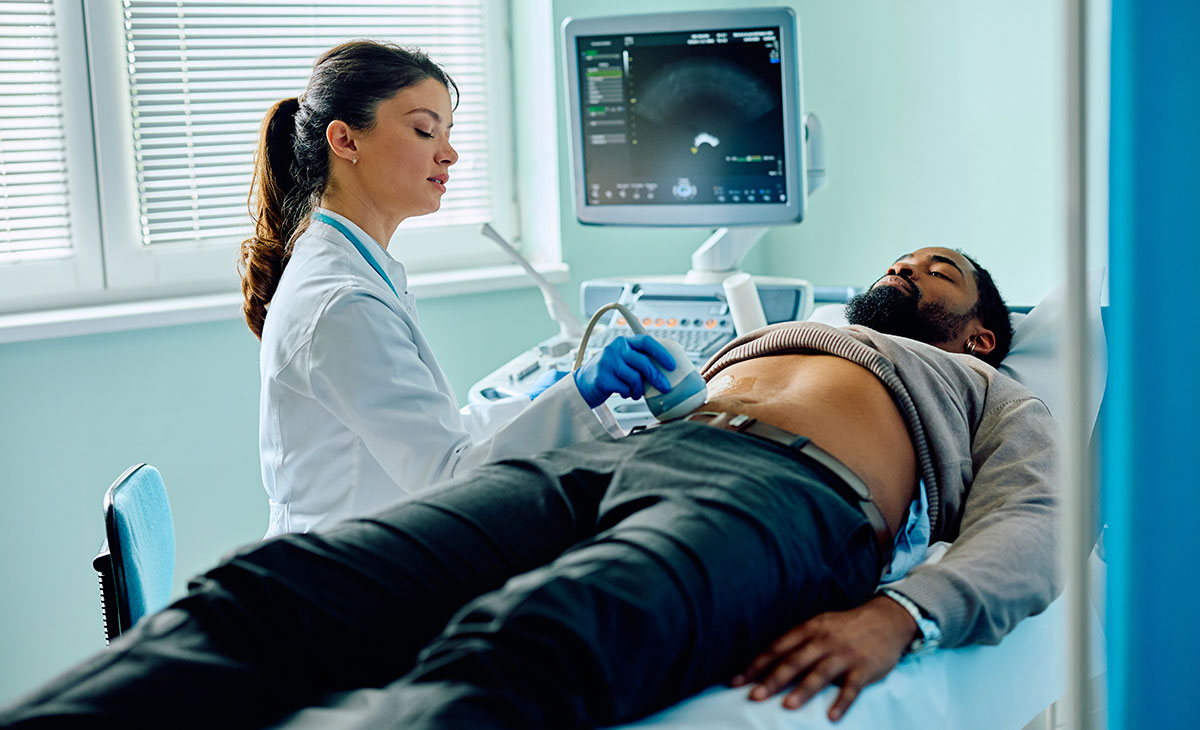Does a hernia always require surgery?
Many patients diagnosed with an inguinal hernia ask themselves the question: Does a hernia really always need to be operated on? Are there cases in which surgery can be avoided? The short answer is: Not every inguinal hernia needs to be operated on immediately. But a hernia can only be healed permanently with an operation. In this article, we explain when a hernia can be treated without surgery. We also show when surgery is necessary. You will learn what determines whether surgery is necessary, what types of hernia there are (e.g. small asymptomatic vs. larger ones with symptoms) and why an individual medical assessment is always important in the end. We also shed light on when a hernia becomes dangerous and when there is no time left for conservative treatment. The aim is to give medical laypeople a clear and well-founded insight. We use the advice from our hernia center VenaZiel in Berlin.

Medically tested by:
Dr. Hamidreza Mahoozi, FEBTS, FCCP
First publication:
April 17, 2025
Updated:
August 25, 2025
Conservative treatment: Inguinal hernia without surgery?
Under a conservative treatment In medicine, a non-surgical treatment is understood to mean a non-surgical approach. In the context of a hernia, this specifically means Wait and see instead of operating as long as there are no alarming symptoms. This strategy is often Watchful Waiting and is mainly used for small, asymptomatic inguinal hernias. is considered.
Important to know: A hernia does not heal on its own. The hernia gap will never close spontaneously. Conservative treatment therefore does not aim to “heal” the fracture, but merely to wait for the right time for surgery – or, in the best case, to spare the patient surgery for a while as long as the fracture does not cause any problems. The procedure for the observation strategy is usually such that check-ups are carried out at regular intervals. Your doctor will check whether the hernia has become larger, whether new symptoms have arisen or whether there are any signs of impending incarceration. You yourself are advised to pay attention to your body and to come in immediately if there are any changes.
For whom is this wait-and-see approach suitable? Studies and experience show that it is particularly effective for male patients with a first-time, small inguinal hernia without symptoms is a justifiable option. It may be advisable to wait and see, especially in older men or men with severe previous illnesses, as immediate surgery under general anesthesia could be riskier for them. However, the prerequisite is that the patient is well informed, has regular check-ups and is prepared to undergo surgery at the first sign of symptoms.
For women However, a cautious wait-and-see approach is is hardly recommended – Doctors tend to recommend surgery at an early stage, even if the hernia is not yet causing any symptoms. The reason for this is that it is not uncommon for a femoral hernia to be hidden in the groin area of women instead of an inguinal hernia. This is more difficult to diagnose, but tends to incarcerate much more frequently (in up to 30% of cases). To be on the safe side, women are therefore usually operated on directly to avoid taking any unnecessary risks. Caution is also not advisable in children – An inguinal hernia in children is practically always operated on promptlyas it does not heal on its own and the risk of incarceration is particularly high in small patients.
A conservative treatment in the narrower sense (e.g. through medication or external aids) does not exist for inguinal hernias. In the past, so-called hernia bands or inguinal bandages were prescribed: Belt-like devices that press on the hernia site from the outside to prevent tissue protrusion. Today we know that such hernia bands are of little help and can even be harmful. The permanent pressure can weaken the abdominal wall muscles, which makes the problem worse in the long term. This is why hernia bands are used nowadays no longer in use. The only sensible “conservative” measure is therefore the aforementioned observation in selected cases – combined with some lifestyle adjustments: If you have a hernia but have not (yet) undergone surgery, you should avoid heavy physical exertion as much as possible, watch your weight and do everything you can to avoid increasing the pressure in your abdomen (e.g. treat chronic constipation, cough carefully, etc.). In this way, you can help to prevent the hernia from enlarging unnecessarily.
Symptomatic vs. asymptomatic inguinal hernia
A decisive factor in assessing whether a hernia requires surgery is Your symptoms. A rough distinction is made:
- Asymptomatic inguinal hernia: The hernia does not cause any pain or noticeable restrictions. Perhaps you have only accidentally discovered a small protrusion that does not otherwise cause you any discomfort. In this case – as described above – you can wait and see in consultation with your doctor. You do not have to undergo surgery immediately, as long as the fracture is really painless and remains small. Nevertheless, even an asymptomatic hernia should be taken seriously: It does not disappear on its own and in 3 out of 4 patients, symptoms do occur within a few years or the hernia enlarges, which then makes surgery necessary. This means that you gain timebut it is unlikely that conservative therapy will be permanent.
- Symptomatic inguinal hernia: This is when the hernia causes discomfort – be it a pulling pain, a feeling of pressure or a foreign body, or even severe pain when moving or straining. At this stage at the latest, you should seriously consider an operation. Pain is a clear signalthat the hernia is affecting your body. Surgery is then indicated to safely relieve you of the symptoms . and prevent further damage. A symptomatic hernia often also restricts the quality of life (people avoid sport or heavy lifting for fear of pain), so timely surgery usually brings a significant improvement in everyday life.
In addition to pain, there are other circumstances that can make a hernia functional can be relevant – for example, if the protrusion becomes very large and bothersome, even if it does not hurt. In men, a large hernia that extends into the scrotum (known as a scrotal hernia) can cause problems, for example when walking or with the fit of clothing. Even then, surgery is more likely to be advised before the situation worsens.
When is a hernia dangerous?
A hernia in itself is not usually life-threatening at first. It becomes dangerous when an incarceration occurs. An incarceration (medical term incarceration) means, for example, that a loop of intestine is trapped in the hernia sac and can no longer get back into the abdominal cavity. This leads to the blood supply to the affected part of the intestine being cut off. Typical alarm signs are: Sudden onset of very severe pain in the groin, a hardened, pressure-painful protrusion that can no longer be pushed away, possibly accompanied by nausea, vomiting or a distended abdomen (sign of intestinal obstruction). The incarcerated area may also be red and overheated. In such a situation, every minute counts, because without a quick operation, the strangulated intestine could die. An incarcerated inguinal hernia is an emergencythat must be operated on immediately.
Fortunately, such a dangerous incarceration does not occur with every hernia. However, statistics show that the longer a hernia remains untreated, the greater the cumulative probability that such an emergency will occur. It is particularly treacherous that an incarceration without much warning can happen – even a fracture that has never caused pain before can suddenly become trapped. Therefore, patients who are waiting to have surgery must always be informed to look out for these signs and then go to hospital immediately.
Overall, experts estimate the risk of incarceration per year at around 1-3% in the case of an inguinal hernia. In women, this risk is significantly higher (up to 30% as mentioned above) due to the more frequent underlying femoral hernias, which is why they do not wait. As a rule of thumb, one can say As long as the fracture remains unproblematic, it is not immediately dangerous – but it does represent a latent dangerwhich exists indefinitely as long as the hernia is there. The recommendation is therefore: A hernia that is not operated on should at least be closely monitored and the person affected should be aware of the warning symptoms. Should an incarceration occur, the following applies without exception: Immediate operation!
Individual medical assessment is important
Whether a hernia should be operated on or not (for the time being) cannot be answered across the board for all cases. Every patient is differentTherefore, the decision must always be based on an individual medical assessment. An experienced surgeon will take into account the size and location of the hernia, your symptoms, as well as your age, life situation and concomitant illnesses. He or she will discuss with you how high your personal risk of complications is and how costly a possible operation would be.
In some situations, the recommendation is clear:
- In children: Inguinal hernias in children are practically always operated on promptly in order to avoid complications.
- In women: Here too, doctors almost always advise surgery, as there is often a high-risk femoral hernia that should be treated urgently.
- In case of acute incarceration: Regardless of age or gender, surgery must be performed immediately, as explained above.
In other cases, the decision is more discretionary: a sprightly man in his mid-fifties with a small, asymptomatic hernia could live for some time without symptoms – but he will be told that surgery is probably due sooner or later. An 80-year-old heart patient with a small hernia, on the other hand, may want to manage without surgery for as long as possible and be given the green light by the doctor, as long as the break remains calm.
Always seek detailed advice from your doctor. Ask all questionsthat you have: How high is my risk if I wait? What are the benefits and risks of surgery in my case? Together, you can then make an informed decision. Many patients are relieved to hear that hernia surgery is a routine procedure nowadays and is very safe in experienced hands. Modern procedures, such as those used at the hernia center VenaZiel in Berlin, often allow for a Outpatient surgery with a short recovery time. So if your doctor advises surgery, you can have confidence that this is the safest way to solve your problem.
Conclusion
A hernia does not always require immediate surgerybut you can only get rid of it permanently with an operation. Small fractures without symptoms can be observed for a while under medical supervision, but there is no spontaneous healing. At the latest when pain occurs, the fracture becomes larger or complications threaten, the time has come for surgery. The boundary between “waiting and seeing” and “having to operate” is reached when a hernia becomes dangerous – in particular due to the risk of entrapment. Then there is an acute need for action.
If in doubt, it is better to ask a specialist. Talking to a specialist – for example in our Hernia Center VenaZiel in Berlin – the best way to clarify which treatment option is you is the right one. Our recommendation is always based on your well-being: Conservative observationas long as it is justifiable, or a hernia operationwhen it is necessary. Either way, we will support you with our expertise and experience so that you can make the best decision for your health. Every patient and every hernia is individual – so let us advise you personally and trust the doctor’s assessment. Your health is our top priority, and together we will find the right way forward.
FAQ – Frequently asked questions about “Inguinal hernia & surgery”
Does every hernia need to be operated on?
No, an inguinal hernia does not always require immediate surgery. Small, symptom-free hernias can initially be observed in stable patients. However, an individual medical decision is essential.
When can an inguinal hernia be observed instead of operated on?
If the hernia is small, it does not cause any pain. It occurs in men. In this case, the doctor can observe it regularly. However, surgery is usually advised for women, children or larger fractures.
How dangerous is it not to have an inguinal hernia operated on?
As long as there is no incarceration, a hernia is not acutely dangerous. In the long term, however, there is a risk of incarceration, which then constitutes a medical emergency. Close medical monitoring is therefore important.
Are there alternatives to surgery for an inguinal hernia?
There is no real conservative therapy. Hernia bands used in the past are now considered obsolete. The only alternative to surgery is so-called “watchful waiting” for small, symptom-free hernias – always under medical supervision.
What does “incarceration” mean in a hernia?
An incarceration occurs when an organ, usually a loop of intestine, becomes trapped in the hernia sac. It is then no longer supplied with blood. This is an emergency that must be operated on immediately, as otherwise tissue can die.
Why is surgery almost always performed on women?
Women are more likely to have a so-called femoral hernia, which has a significantly higher risk of incarceration. Specialists therefore recommend early surgery, even if the hernia does not initially cause any symptoms.


